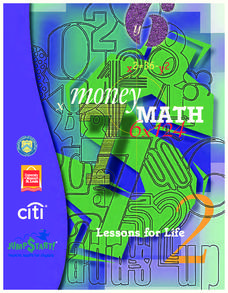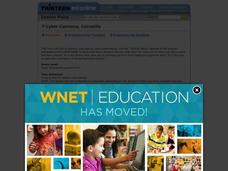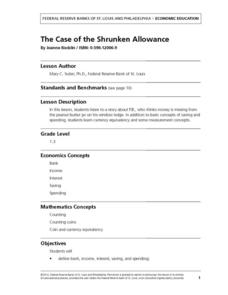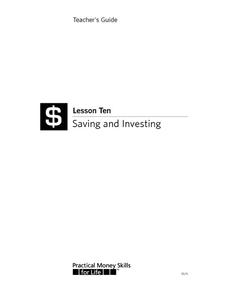Practical Money Skills
Budgeting Your Money
How do you make sure that your income doesn't disappear before you have a chance to save it? Use a creative budgeting activity to teach learners in both special education and mainstream classes how to keep track of their expenditures and...
University of Missouri
Money Math
Wouldn't your class members love to become millionaires? It doesn't happen overnight. Teach young entrepreneurs about personal finance and money management with a series of lessons focused on money math. Pupils learn about banking and...
Curated OER
Short-Term and Long-Term Savings Goals
Fifth graders discover how saving money can apply to their lives. For this personal finance lesson, 5th graders use the book The Leaves in October, as a conversation starter on income, savings and setting goals. Students explore the...
Curated OER
Personal Savings: Saving Money for Those Items you Really Want
Young scholars explore how to save money to buy the things they want.
University of Missouri
Money Math
Young mathematicians put their skills to the test in the real world during this four-lesson consumer math unit. Whether they are learning how compound interest can make them millionaires, calculating the cost of remodeling their bedroom,...
Curated OER
Savings Accounts and Interest
First graders study money, banks, and getting interest on money. In this consumer math lesson, 1st graders listen to Stan and Jan Berenstain's, Berenstain Bears' Trouble With Money. They use the concepts in the book to discuss...
Curated OER
The Berenstain Bears Trouble with Money
Students will explore good and services, income and saving listening to the story The B. Bears Trouble With Money. For this early economic lesson, students discuss what it means to earn money doing services and save money to buy goods. ...
Curated OER
Money, Money, Honey Bunny!
Learners read a story about spending and saving money and talk about the difference between goods and services. In this money lesson plan, students also play a matching game to review the story and practice rhyming words from the story.
Curated OER
Saving and Investing
Fifth graders participate in activities to promote understanding of investing and saving. In this saving and investing lesson, 5th graders design a portfolio, play a card game and write a skit about the importance of investing.
Curated OER
Cyber Currency, Currently
Learners explore the value of currency and how to save and earn interest. In a key lesson plan, kids even get to purchase items in their classroom's general store. It's a fun way to learn the importance of being financially literate!
Federal Reserve Bank
Beatrice’s Goat: A Lesson on Savings Goals
Youngsters learn the meaning of saving and how to reach savings goals by first reading a story of a young Ugandan girl who is gifted a goat, and then discovering the opportunity costs of savings decisions made by her and her family.
Visa
Nothing But Net: Understanding Your Take Home Pay
Introduce your young adults to the important understanding that the money they receive from their paychecks is a net amount as a result of deductions from taxes. Other topics covered include federal, state, Medicare and social security...
Curated OER
Wise Pockets
Using children's picture books and role-playing activities, youngsters begin to learn about personal finance management. These lesson plans are engaging and intend to endow pupils with skills for making wise decisions with money as they...
Federal Reserve Bank
It's Your Paycheck
Beyond reading and arithmetic, one of the most important skills for graduating seniors to have is fiscal literacy and responsibility. Start them on the right financial track with nine lessons that focus on a variety of important personal...
Federal Reserve Bank
The Case of the Shrunken Allowance
An allowance is an important thing! Make sure your kids know how to save and spend their own money. Using the book The Case of the Shrunken Allowance as a starting point, this plan covers income, spending and saving, counting, and more.
Visa
Saving and Investing
Impress upon your young adults the importance of saving and investing, and give them a foundational vocabulary from which they can continue to build their financial literacy. This lesson plan covers short- and long-term budget goals,...
Practical Money Skills
Making Decisions
A set of quizzes and assessments would make a great companion to your lesson plan on making decisions and opportunity risks. Learners watch a PowerPoint before answering multiple choice questions about interest rates, saving money, and...
Federal Reserve Bank
Piggy Bank Primer: Saving and Budgeting
Introduce young economists to basic concepts like unlimited wants, opportunity costs, saving, and budgeting with this workbook designed by the Federal Reserve Bank.
Curated OER
Money Lessons That Cash In
Every child is fascinated by money. Teachers can use money lessons that expand on this inherent interest.
Curated OER
Saving Makes Cents
Students identify ways families save money. In this financial lesson, students read the book A Chair for My Mother and discuss ways to save money. Students identify coin values and practice counting money.
Curated OER
Saving and Creating a Personal Budget
Fifth graders brainstorm ways to save money. In this financial awareness lesson, 5th graders read a chapter from the book, From the Mixed-Up Files of Mrs. Basil E. Frankweiler and create a personal budget for themselves.
Curated OER
Why We Save
Students discover how to save money. In this financial planning lesson, students read the story Spend or Save? and discuss ways to save money. Students choose a character from the story and write about a financial decision they had to make.
Federal Reserve Bank
Less Than Zero
Perry the penguin wants to buy a new scooter, but he doesn't have any funds! Walk your kids through the short book Less Than Zero, and have them track his borrowing, spending, and saving on a line graph while you read. Pupils will learn...
American Consumer Credit Counseling
Money Mania
Become a money maniac with a fun set of worksheets about budgeting! Kids read about how to save, earn, budget, and borrow money, and fill out their own budget and expenses.

























